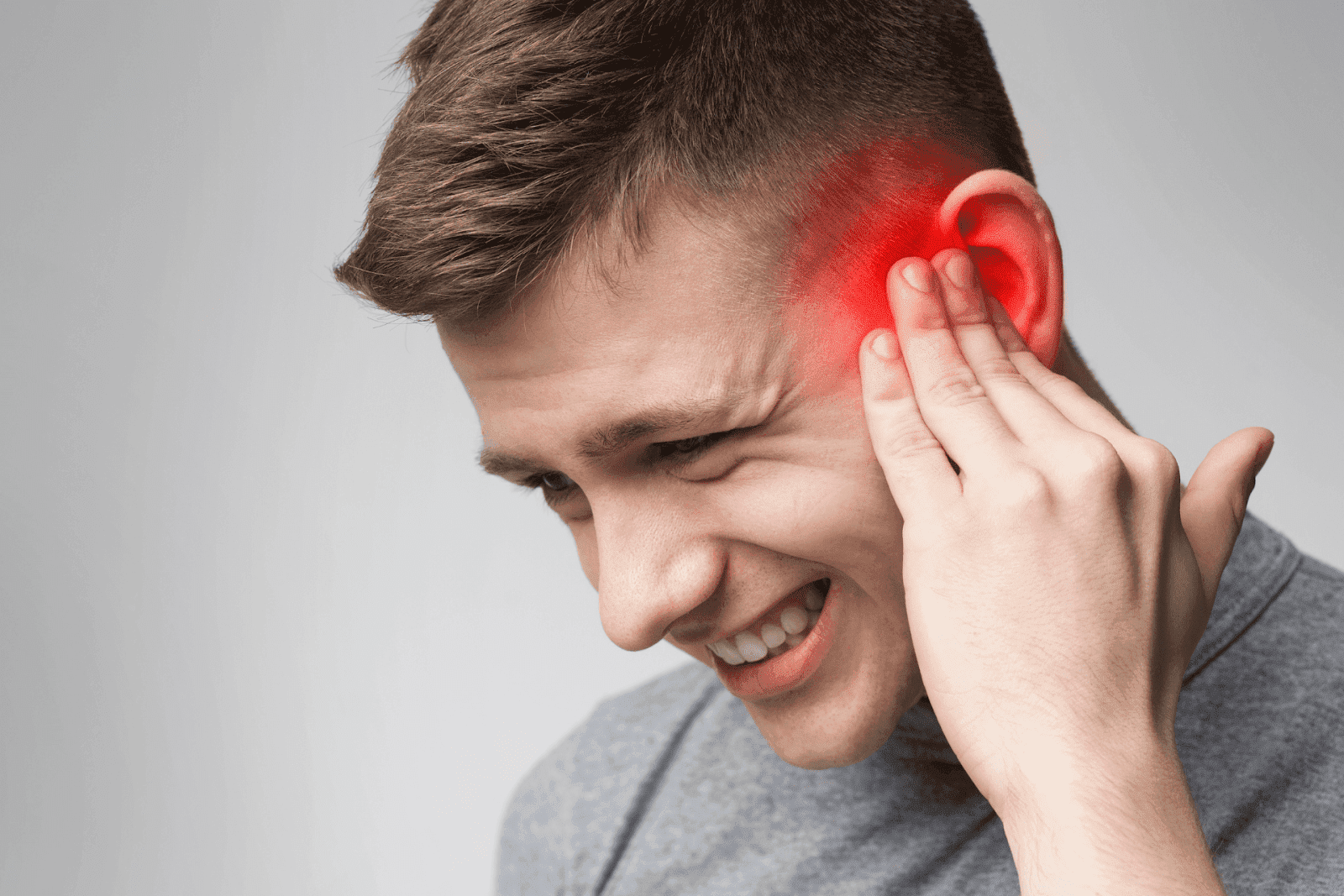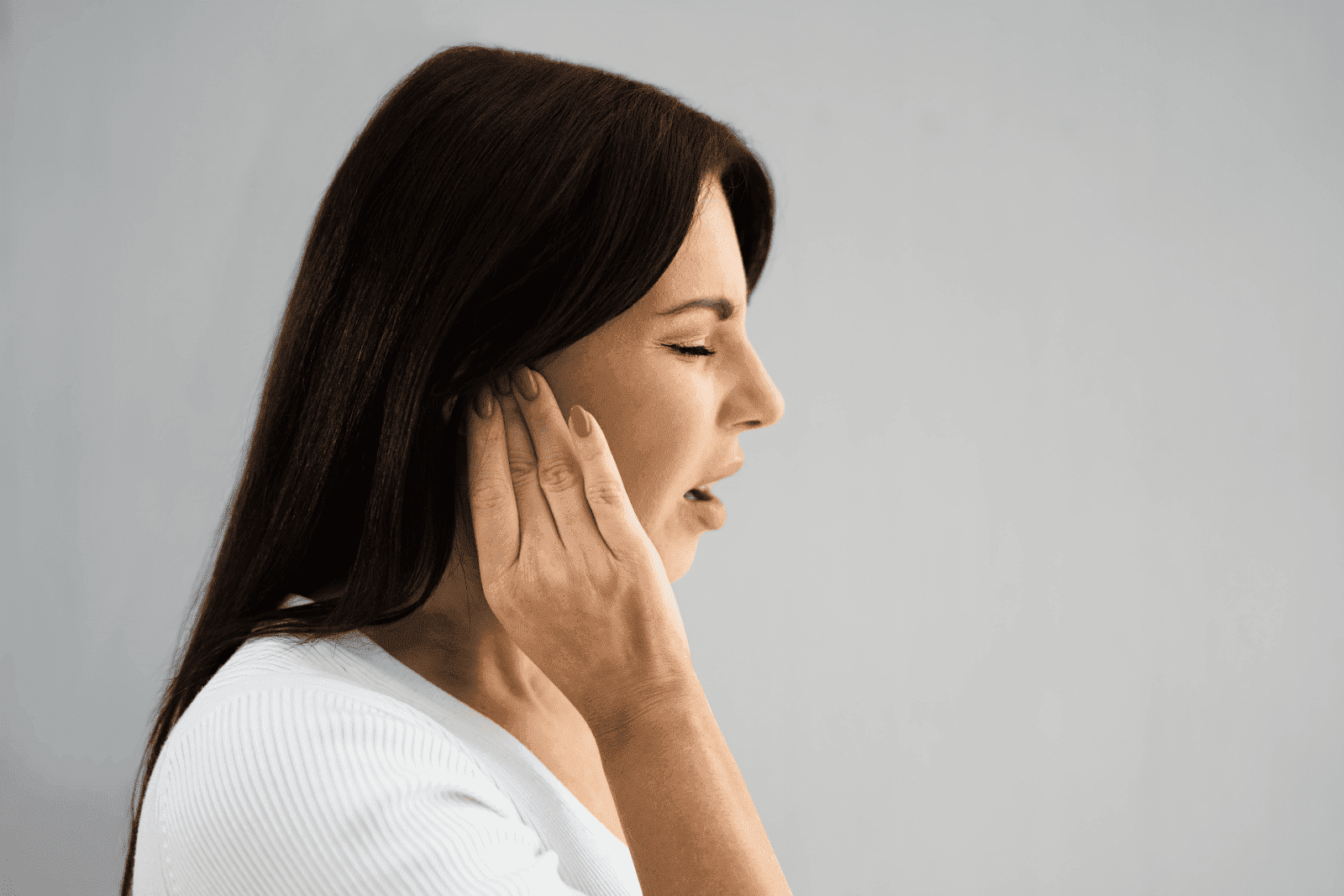Pain in Your Ear While Chewing: What Might Be Causing It
Experiencing pain in your ear when you chew can be both uncomfortable and concerning. This type of discomfort can arise from a variety of causes, ranging from minor issues to [...]
Read More
Medically reviewed by Alan Lucks | MD, Alan Lucks MDPC Private Practice - New York on October 14th, 2025.
TMJ disorders cause 80% of jaw-related ear pain cases due to the temporomandibular joint sitting directly in front of the ear canal, with shared nerve pathways amplifying discomfort during chewing.
Otitis externa (swimmer's ear) creates sharp pain when jaw movement stretches the inflamed ear canal, while middle ear infections cause deeper, throbbing pain that worsens with pressure changes from chewing.
Dental abscesses in upper molars can radiate pain to the ear through the trigeminal nerve, often accompanied by tooth sensitivity to hot/cold and facial swelling on the affected side.
Anti-inflammatory medications like ibuprofen 400-600mg every 6-8 hours target both jaw joint inflammation and ear pain more effectively than acetaminophen alone for most non-infectious causes.
Avoiding hard, chewy foods for 7-10 days while applying moist heat for 15-20 minutes several times daily can significantly reduce symptoms and prevent further joint irritation.
Experiencing pain in your ear when you chew can be both uncomfortable and concerning. This type of discomfort can arise from a variety of causes, ranging from minor issues to more serious medical conditions. Understanding the potential reasons behind ear pain during chewing is crucial for seeking the right treatment and relief. This article explores the common causes, symptoms, and treatment options for ear pain associated with chewing, helping you make informed decisions about your health.
 Common Causes of Ear Pain When Chewing
Common Causes of Ear Pain When ChewingEar pain while chewing is often linked to problems in or around the ear, jaw, or muscles involved in chewing. Some causes are temporary and easily treatable, while others may require medical attention.
The temporomandibular joint connects your jawbone to your skull, allowing you to chew and speak. TMJ disorders are a frequent cause of ear pain during chewing. These disorders can result from injury, arthritis, jaw misalignment, or muscle strain. Symptoms often include jaw clicking, difficulty opening your mouth, and pain that worsens with chewing or talking.
TMJ pain may feel like it is coming from the ear, but it actually originates from the joint near the ear canal. Stress and teeth grinding can exacerbate TMJ symptoms, making it important to identify and manage these factors. Treatment options may include physical therapy, dental splints, or even medications to alleviate pain and inflammation. In more severe cases, surgical intervention might be necessary to restore proper function and relieve discomfort.
Middle ear infections (otitis media) or outer ear infections (otitis externa) can cause pain that intensifies when chewing. The movement of the jaw can irritate the inflamed tissues in or around the ear. Ear infections are often accompanied by other symptoms such as hearing loss, fluid drainage, fever, or a feeling of fullness in the ear.
Children are particularly prone to middle ear infections, but adults can also develop them due to colds, allergies, or sinus infections. Prompt treatment is essential to avoid complications. Antibiotics may be prescribed for bacterial infections, while warm compresses can help alleviate pain. Additionally, keeping the ears dry and avoiding irritants can prevent future infections and promote healing.
Problems with your teeth or gums can also cause ear pain during chewing. Tooth abscesses, cavities, impacted wisdom teeth, or gum infections can create referred pain that feels like it is coming from the ear. Chewing puts pressure on the affected tooth or gum, triggering discomfort.
Dental pain associated with ear discomfort often requires evaluation by a dentist to address the underlying cause effectively. Regular dental check-ups are crucial for early detection of issues like cavities or gum disease, which can lead to more severe complications if left untreated. In some cases, dental procedures such as fillings, root canals, or extractions may be necessary to alleviate pain and restore oral health.
Less commonly, ear pain while chewing can be due to conditions such as:
Sinus infections: Sinus pressure can radiate to the ear and worsen with jaw movement.
Earwax buildup: Excessive earwax can cause pressure and pain, especially when the jaw moves.
Trigeminal neuralgia: A nerve disorder causing sharp facial pain, sometimes triggered by chewing.
Injury or trauma: Any recent injury to the jaw or ear area can result in pain during chewing.
In addition to these causes, certain systemic conditions, such as fibromyalgia or multiple sclerosis, can also manifest as ear pain during chewing. These conditions may affect the nerves and muscles involved in the chewing process, leading to discomfort. It’s essential for individuals experiencing persistent ear pain to consult with a healthcare provider to rule out any serious underlying conditions and receive appropriate treatment.
While some causes of ear pain during chewing resolve on their own or with home care, others require professional evaluation. If you experience any of the following, it is important to consult a healthcare provider promptly:
Severe or persistent ear pain lasting more than a few days
Hearing loss or ringing in the ear
Swelling, redness, or discharge from the ear
Difficulty opening or closing the mouth
Fever or other signs of infection
Trauma to the ear or jaw area
For convenient and affordable medical consultations, consider using telehealth services such as Doctronic.ai. Doctronic offers 24/7 video visits with licensed doctors across all 50 states, providing expert advice from the comfort of your home. With over 10 million users, Doctronic is revolutionizing access to quality healthcare, making it easier than ever to get answers and treatment recommendations quickly.
In addition to the symptoms listed above, it is also crucial to pay attention to any accompanying signs that may indicate a more serious underlying condition. For instance, if you notice that the pain is radiating to other areas such as the neck or head, or if it is accompanied by dizziness or balance issues, these could be red flags that warrant immediate medical attention. These symptoms may suggest a more complex issue involving the inner ear or even neurological concerns that should not be overlooked.
Furthermore, individuals with pre-existing health conditions, such as diabetes or autoimmune disorders, should be particularly vigilant. These conditions can complicate infections and may lead to more severe complications if not addressed promptly. Keeping a detailed record of your symptoms, including their duration and any triggers, can be incredibly helpful during your consultation. This information will assist your healthcare provider in making a more accurate diagnosis and determining the best course of action for your ear pain.
Diagnosing the cause of ear pain during chewing typically involves a thorough medical history and physical examination. A healthcare provider will ask about the nature of the pain, its duration, and any associated symptoms. They may examine your ears, jaw, teeth, and throat to identify signs of infection, inflammation, or structural problems.
In some cases, additional tests such as X-rays, CT scans, or MRIs may be necessary to evaluate the temporomandibular joint or detect hidden dental issues.
Treatment depends on the underlying cause of the ear pain. Some common approaches include:
TMJ Disorders: Management may involve pain relievers, anti-inflammatory medications, jaw exercises, warm compresses, stress reduction techniques, or a mouth guard to prevent teeth grinding.
Ear Infections: Bacterial infections often require antibiotics, while viral infections may be managed with pain relief and supportive care.
Dental Problems: Addressing cavities, abscesses, or gum disease through dental procedures is essential to relieve pain.
Home Remedies: Warm compresses, over-the-counter pain medications, and avoiding hard or chewy foods can help ease symptoms.
For personalized treatment advice and quick access to medical professionals, telehealth platforms like Doctronic.ai provide a valuable resource. Their AI-powered system provides fast, evidence-based answers and connects you with doctors for affordable video visits whenever you need them.
Taking steps to maintain ear and jaw health can reduce the risk of experiencing pain while chewing. Consider the following preventive measures:
Practice good oral hygiene to prevent dental infections
Avoid excessive jaw movements or chewing hard foods if you have TMJ issues
Manage stress to reduce teeth grinding and jaw clenching
Protect your ears and jaw from injury during sports or physical activities
Seek early treatment for sinus or ear infections
Regular check-ups with your healthcare provider or dentist can help identify and address potential problems before they cause significant discomfort.
 Your Path to Pain-Free Meals Starts With the Right Care
Your Path to Pain-Free Meals Starts With the Right CarePain in your ear while chewing can stem from a variety of causes, including TMJ disorders, ear infections, dental problems, and other less common conditions. Recognizing the symptoms and understanding when to seek medical care is key to effective treatment and relief.
Thanks to advances in telehealth, accessing quality medical advice has never been easier. Doctronic.ai combines AI technology with licensed doctors to provide fast, affordable, and personalized healthcare services. Whether you need a quick diagnosis, treatment recommendations, or a second opinion, Doctronic is a trusted option for managing ear pain and other health concerns from home.
If you or a loved one is experiencing persistent or severe ear pain while chewing, don’t hesitate to reach out to a healthcare professional. Early intervention can prevent complications and help you get back to enjoying your meals pain-free.
If you're struggling with ear pain while chewing, don't wait for it to worsen. Doctronic offers a revolutionary approach to healthcare with our AI Doctor, providing you with free, instant, and personalized medical advice. Our AI is designed to remember you and your medical history, ensuring the most personal care available. Get answers based on the latest medical research without leaving your home. Skip the line and experience the future of healthcare. Talk to an AI Doctor Now, for free.
This condition typically resolves within 1-2 weeks with proper treatment targeting the underlying cause, whether infectious, dental, or joint-related. Persistent symptoms beyond 10 days or severe pain with fever requires immediate medical evaluation to prevent complications. If you're experiencing ear pain while chewing along with jaw clicking or difficulty opening your mouth, Doctronic can help determine the cause and guide appropriate treatment.
Experiencing pain in your ear when you chew can be both uncomfortable and concerning. This type of discomfort can arise from a variety of causes, ranging from minor issues to [...]
Read More